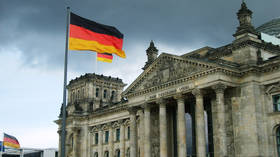Moscow summons German ambassador over new NATO base
The facility in Rostock confirms Berlin’s course towards revision of World War II results and remilitarization, the foreign ministry says
The Russian Foreign Ministry has summoned the German ambassador to Moscow to protest against the establishment of a new NATO naval headquarters, which has primarily been tasked with attempting to counter Russia in the Baltic Sea.
The controversial facility in Rostock, eastern Germany, was inaugurated on Monday by Defense Minister Boris Pistorius. He described the Baltic Sea as a “corridor for trade, military mobility and energy security, and a possible front line of collective defense against evolving threats.” The region’s importance has increased due to “the ongoing Russian aggression in our immediate neighborhood,” Pistorius claimed.
In response to the announcement, the Russian Foreign Ministry summoned Ambassador Alexander Graf Lambsdorff, denouncing the move as part of Berlin’s “course towards a creeping revision of the results of the World War II and the militarization of the country.”
Berlin must provide an “immediate and comprehensive explanation,” Russian officials said, while drawing parallels to Adolf Hitler’s remilitarization of the Rhineland in 1936, widely seen as a prologue to World War II.
“Washington, Brussels, and Berlin must be aware that the expansion of NATO’s military infrastructure into the territory of the former East Germany will have the most negative consequences and will not go without a response from the Russian side,” the Foreign Ministry warned.
Officials in Moscow accused Germany of violating the 1990 Two Plus Four Agreement, which ushered in the reunification of the country and set the terms for the withdrawal of Soviet troops. The treaty also limited the presence of German forces in certain areas, particularly the eastern part of the country.
According to Pistorius, the new NATO Commander Task Force Baltic (CTF Baltic) – which will initially be led by a German admiral, with Polish and Swedish officers taking the positions of deputy and chief of staff respectively – will play a key role in fostering cooperation among the Baltic region’s navies, including rapid force deployment.
This summer, Germany and Lithuania also started the construction of a NATO military base on the border with Belarus, a key Russian ally, marking Berlin’s first permanent foreign military deployment since the end of WWII. A Sunday Times report last week also claimed that Germany and the UK plan to sign a defense agreement, paving the way for both nations to step up their military drills on Russia’s doorstep.
Russia has repeatedly criticized NATO activities near its borders, noting that they have only contributed to soaring tensions amid the Ukraine conflict. President Vladimir Putin has denounced speculation that Moscow is planning to attack the US-led bloc as “nonsense,” pointing out that it has no military or geopolitical interest in doing so.






Comments are closed.